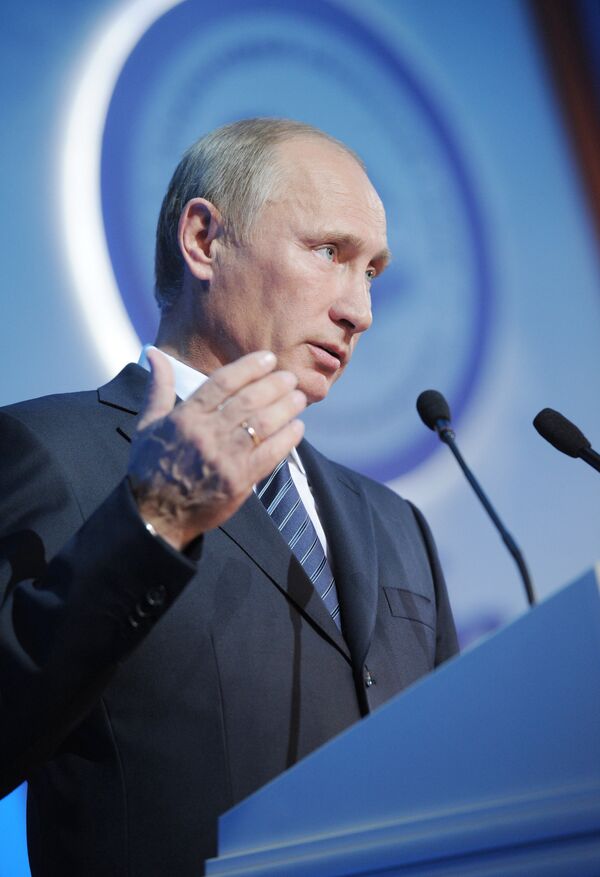As Russia settles in for a third presidential term under current Prime Minister Vladimir Putin following elections next March, foreign leaders have expressed their readiness, if not enthusiastically, to continue cooperating with Russia’s returning leader. While there are fears that the next Putin presidency may mark a return to the strained relations between Russia and its foreign partners during the mid-2000s, analysts stressed that the shift is more likely to be in the tone of Russia’s foreign policy than in its actual agenda.
In the Return to a Putin Presidency, Style and Not Substance Will Be the Major Shift in Russia’s Foreign Policy
When the rumor surfaced that a rift in the tandem might drive both Putin and President Dmitry Medvedev to run in the 2012 presidential elections, it was largely fueled by an unusually public disagreement between the two leaders over UN resolution 1973, which established a no-fly-zone over Libya. Putin first openly criticized the resolution, which Russia failed to veto, as flawed and said that it reminded him of a crusade. Medvedev later called Putin’s response unacceptable, though he failed to call out the prime minister by name. The local Russian press eagerly jumped at the possibility that a western-oriented Medvedev might be jockeying for position with Putin before the elections, igniting a spate of rumors that were only buried once and for all last Saturday with Putin’s announcement of his candidacy.
The two leaders cultivated sharply different public personas in their relations with international leaders, but the rift over the UN resolution was possibly the only substantial disagreement in foreign policy that emerged under the carefully managed tandem, noted Fyodor Lukyanov, the editor in chief of Russia in Global Affairs magazine. Except perhaps for Libya, everything that has been done since Medvedev became president was a coordinated stance of the tandem, he said.
For Medvedev, the past four years have seen little progress in his stated policy goals of extending Russia’s influence through a more open relationship with the West, argued Alexander Rahr, and ultimately a period that failed to increase Russia’s weight in the world. The setbacks came quickly, in particular when the war in Georgia broke out in 2008, which forced him to adjust his foreign policy towards dissuading possible NATO expansion. By the time of the reset with the United States, Medvedev had already lost valuable time, he said. He was not successful in developing an independent foreign policy.
One of the likely explanations for Medvedev’s limited foreign policy success has been the tacit understanding that he plays the junior role in the country’s leading tandem. Few foreign leaders, it seemed, could believe any claims that questions of foreign policy were exclusively handled by Medvedev. As a result, they opted to meet with both Medvedev and Putin during state visits to Russia in recent years, as did United States Vice-President Joseph Biden earlier this year. By 2010, there was a sense that foreign leaders recognized that Putin was still very much involved in the basic foreign policy decisions, said Rahr.
More than substance, what divides Putin and Medvedev is a stylistic difference, with Putin being the more emotional and combative of the pair, said Lukyanov. Overall, Medvedev gave a certain flavor to Putin’s foreign policy; he was the smiling face of Russian foreign policy, he said.
With Putin’s likely return to the Kremlin, analysts see a possible return to Russia’s strained relations with the West during Putin’s second term. A new cold war with the West won’t happen. It will just be a very cold and uncomfortable world, based on a limited circle of shared interests and almost full lack of mutual trust, said political analyst Konstantin Eggert on Kommersant FM radio.
During Medvedev’s administration, Putin has maintained an active presence in Russia’s relations with the former Soviet states, in particular touting a customs union with Belarus and Kazakhstan that he is hoping to attract Ukraine into as a counterweight to the European Union. But in his personal relations with the United States and Europe, as well as in the Arab world, Putin’s return as a divisive figure may make an even more considerable difference.
The European and American reaction to Putin’s likely return has been lukewarm but effectively pragmatic. Adding to public assurances that the reset would not suffer during a Putin administration, a senior Obama administration official said: This is not a change in the political system because we have always known what the political system was," reported the Wall Street Journal. German Chancellor Angela Merkel, who has maintained a good working relationship with Medvedev, has also said that Germany would be ready to work with any sitting Russian president, despite rumors of her personal dislike for Putin.
While Putin’s return to power may complicate relations with the Western leaders, it may at least simplify the confusion of the tandem by establishing clear authority under Putin, noted Lukyanov. For those working with Russia, dealing with the real boss is preferable to dealing with those who are communicating for him, said Lukyanov, referring to Putin and Medvedev.
The views expressed in this article are the author's and do not necessarily represent those of RIA Novosti.

